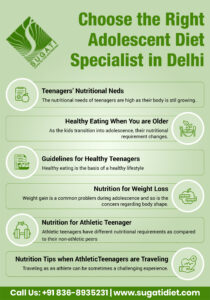
Energy is the fuel for the human body to grow, develop, and function. The energy produced by the food is used by the body to perform basic functions, physical activity, and also for the growth and development of cells and tissues.
The body derives this energy in the form of calories from the food that an individual consumes. Along with calories, the food provides various other nutrients such as proteins, fats, carbohydrates, vitamins, and minerals.
The requirement for calories and all other nutrients varies within all age groups. Age, gender, physical activity pattern, and physiological condition of the individual are the factors that decide the nutritional requirement of any individual.
Teenage/ Adolescence is a period of rapid growth and development. It marks the onset of puberty and significant physical development in both boys and girls. Usually, the growth spurt in girls occurs at the age of 12 years, and in boys, it occurs at the age of 14 years.
Teenagers’ nutritional needs
The nutritional needs of teenagers are high as their body is still growing. This age brings with it a lot of physical and metabolic changes. These changes are associated with an increased requirement of all the nutrients.
National Institute of Nutrition (NIN) and the Indian Council of Medical Research (ICMR) have listed the Recommended Dietary Allowances (RDAs) for various nutrients for adolescents.
| Gender | Age group | Calories (Kcals/d) | Proteins (gm/d) | Carbohydrates (gm/d | Fats (gm/d) | Calcium (mg/d) | Iron (mg/d) |
| Boys
Girls |
13-15 years | 28602400 | 36.434.7 | 100100 | 5035 | 800800 | 1517 |
| Boys
Girls |
16-18 years | 33202500 | 45.137.3 | 100100 | 4035 | 850850 | 1818 |
Calories:
Total calorie intake for the day depends largely on the weight of the teenager. Peer group influences, social media, availability of a large variety of foods, and lack of physical activity can result in overweight/ obesity.
In this situation, the total calorie intake of the teenager has to be adjusted accordingly without compromising on other nutrients so as to be able to support the physical and psychological transition from puberty to adulthood.
It should however be ensured that the consumption of high-calorie foods such as cold drinks, junk foods, ice creams, chocolate, etc. be limited as these foods provide empty calories without any significant nutrients.
Proteins:
Proteins are essential for the various metabolic and developmental changes taking place during this period. An adequate amount of protein should be present in the diet so as to aid in the development of bones, muscles, and other organs.
For the protein to be used for development activities, it is necessary to have an adequate amount of calories, else the protein would be used for energy production.
Foods such as milk and milk products, eggs, fish, pulses, sprouts, soybean, nuts, and oilseeds are some good sources of protein.
Fats:
Fats are an excellent source of energy, however, their judicious use is important to get maximum benefit. Dietary fats provide omega -3 and omega-6 fatty acids which are necessary for the development of the brain and nervous system. Fats also help in the absorption of various vitamins like Vit. A, D, E &K.
A diet containing mixed fats (both Monounsaturated and Poly-unsaturated fatty acids – MUFA & PUFA) is recommended. Since teenagers eat a lot of junk food, they compromise on healthy fats. Saturated fats like ghee and butter can be used sparingly, however, foods containing trans-fats (fried foods, cream, mayo, and the likes) need to be completely avoided.
Single-pressed olive oil, groundnut & soybean oil, refined oils, nuts and oil seeds, avocado, fish, etc. are some sources of healthy fats.
Calcium:
Adequate calcium is required for the development of strong bones. The bone development taking place during this period lays the foundation for the lifetime. A strong bone structure that develops during adolescence helps in the prevention of demineralization of the bones in older ages.
Diet deficient in calcium can make an individual prone to osteoporosis in later years of life. Along with calcium, Vitamin D is of equal importance. Sunlight, mushrooms, and egg yolk are rich sources of vitamin D.
Milk and milk products like curd, cheese, almonds, walnuts, soybean, green leafy vegetables, and oilseeds are rich sources of calcium. However, maximum calcium absorption occurs from animal sources as compared to plant sources.
Iron:
Anemia is a very common problem in teenagers. Consumption of highly processed iron-deficient foods and unbalanced diets which do not provide adequate iron are major reasons.
The main function of iron in the human body is to make hemoglobin. Low levels of hemoglobin are associated with fatigue, weakness, headache, cold hands, and feet, lack of concentration, shortness of breath, paleness of hands and eyes, and brittle nails.
Animal sources like liver and meat contain heme iron, which is more readily absorbable as compared to plant sources of iron like dark green leafy vegetables, whole grains, nuts, beans, dry fruits, figs, raisins, and oilseeds. The presence of an adequate amount of Vitamin C in the diet helps in the absorption of iron. Lemon juice, oranges, sprouts, guava, and gooseberries are all rich sources of Vitamin C.

Healthy eating when you are older:
As the kids transition into adolescence, their nutritional requirement changes. Adolescence is a period of profound growth and development and the diet should be able to support this process.
A balanced diet including all vital nutrients in adequate amounts is the key to meeting all the nutritional requirements of teenagers. It is important to consume a well-balanced diet so as to get proper nutrition and avoid foods that are highly processed and are high in fat, sugar, and/or salt.
A healthy plate for teenagers should include whole grains, pulses, green vegetables, milk and milk products, fruits, and eggs/ fish/ meat to provide for the macro-nutrients (carbohydrates, proteins, and fats) and micronutrients (vitamins, minerals, and fiber). Along with this adequate amount of water is also necessary.
Highly processed foods are usually deficient in important nutrients like protein, calcium, iron, and other micronutrients but are laden with calories. Excessive consumption may result not only in weight gain/ obesity but also in micro-nutrient deficiencies, the most common being anemia.
Guidelines for Healthy Teenagers
Healthy eating is the basis of a healthy lifestyle. The diet of teenagers should be wholesome with regards to all nutrients. Cutting down on junk and concentrating on balanced meals helps to cope with the growing demands of the body. A healthy diet includes eating nutrient-rich and whole foods from all the food groups providing adequate calories, protein, healthy fats, vitamins, and minerals.
- Plan for 3 regular meals with healthy snacking in between the meals.
- All food groups should be included in all meals so as to cater to the demands of macro and micronutrients.
- Adequate calories and proteins should be incorporated into the diet to support the growth spurt.
- Eating home-cooked foods along with family members should be made a habit.
- The use of electronic gadgets like television, computer, and mobile while eating should be restricted.
- Teens have been reported to be deficient in micronutrients like calcium, iron, and fiber. The meals should be planned so as to cater to these vital nutrients.
- Efforts should be made to minimize the consumption of carbonated drinks, and processed foods high in sugar and fats, and deficient in other necessary nutrients.
Instead, teenagers should be encouraged to make healthy food choices by including foods like buttermilk, coconut water, fruits, nuts, seeds, etc. in their diet.
- Teenagers must be involved in regular physical activity. Any physical activity or sports that are of interest should be taken up and performed regularly. One hour a day of physical activity is beneficial for maintaining a healthy weight
- Include the teenagers in healthy meal planning, cooking, and food shopping.
- Encourage the teenagers to read labels and find out whether or not, certain ingredients are useful/ harmful for them.
Nutrition for weight loss:
Weight gain is a common problem during adolescence and so is the concern regarding body shape. Excess weight/ obesity has many harmful health effects during teenage as well as in the later years of life. Taking care and getting rid of this extra “baggage” at the right time is very important.
Losing weight is not very difficult and can be comfortably done by following a healthy diet and physical activity. However, in the pursuit of losing weight fast, many times teenagers resort to quick fixes and fad diets which might not be practical and may be doing more harm than good to the body.
Here are certain tips which would be helpful in losing weight and keeping it off forever.
- The first step towards losing weight and achieving a healthy body is to cut down on sugar. Excess sugar gets converted into fat in the body leading to weight gain. Carbonated drinks, juices, sodas, and energy drinks are loaded with sugar and not only lead to weight gain but also make the teenager prone to diseases like diabetes, non-alcoholic fatty liver disease, and acne.
- Choosing healthy wholesome, and nourishing foods to fuel the body is an ideal way of losing weight. Whole grains, pulses, fruits, vegetables, egg/ milk/ cottage cheese/ lean meats are some of the foods which have a higher nutritive value and provide satiety also.
- Don’t make “fat” the enemy. Consuming healthy fats support many body functions and are necessary for maintaining optimal health. Instead of cutting down on fat completely, just swap the high-fat foods from the teenager’s diet and encourage them to include healthy sources of fat.
- Mindful eating should be made a habit. It improves the teenager’s relationship with food. Distractions like mobiles, television, and computers might result in over-eating and thus weight gain.
- Adequate water consumption is important for overall health as well as is helpful in losing weight. Drinking water helps in regulating the appetite and prevents unnecessary snacking. Consuming water instead of sugary and carbonated drinks also prevents the intake of excess sugar and thus calories.
- Excessive stress can negatively affect the weight loss process. Stress leads to hormonal changes which can result in increased hunger and thus weight gain.
- Cutting down on processed foods like ready-to-eat cereals/ foods, packaged foods, tinned fruits and vegetables, fried foods, and foods high in salt saves one from getting empty calories that are devoid of many vital nutrients.
- A generous helping of vegetables and fruits adds adequate fiber to the diet. This helps the individual to keep full for a longer period of time thus reducing the craving for unhealthy snacking.
- Avoid skipping meals. Teenagers should not be encouraged to completely skip meals, howsoever tempting it might look like an easy resort to lose weight. Skipping important meals increase the tendency for unhealthy snacking. Also, the body adapts to a low-calorie intake thus making the weight loss process difficult.
- Physical activity is an integral part of losing weight. Indulging in regular physical activity not only helps in losing weight but also benefits the cardiovascular and respiratory systems of the body.
- Adequate, and undisturbed sleep is important for weight loss. Inadequate sleep (less than 7-8 hours) has been shown to be associated with more weight gain. For the body to function well, restful sleep is a must.
- Stop looking for quick fixes to lose weight. Any diet that deprives the body of vital nutrients is not practical and sustainable. Fad diets are good for short-term weight loss but are not recommended for sustainable health benefits.
- It is very important to set realistic and achievable goals. In the quest to achieve a particular body shape, many teenagers resort to unhealthy ways of weight loss. Setting realistic and practical goals keeps the individual motivated.
- Support of the family and peer group is important and plays a crucial role in deciding the approach toward weight loss.
- Consult a qualified clinical nutritionist. She would help in planning sustainable and practical diet plans which will help the teenagers not only lose weight but also adopt a healthy lifestyle.
Nutrition for Athletic Teenagers
Athletic teenagers have different nutritional requirements as compared to their non-athletic peers. In addition to providing the body with extra nutrients for extra activity, the diet also needs to take care of their proper growth and development.
To excel in their performance, these teenagers require more calories and proteins. However, the nutritional requirements increase but there are no special foods or supplements which are required for improved performance. It’s just about including the right foods in the right quantities.
- Include varied foods in your diet. Nothing can undermine the power of balanced meals and healthy snacks for young athletes. The meals and snacks should be wholesome with regards to all nutrients, so as to make up for the need of the increased requirements.
- Athletic teenagers require more protein as compared to non-athletic teens. This increased requirement for protein can be fulfilled through the diet. In most cases, supplements are not required. Consuming a planned amount of dairy products, nuts, soybean, eggs, lean meat, and poultry makes up for the increased requirement.
- Carbohydrates are an essential part of an athletic teenager’s diet. They are the major source of fuel and energy for the body. Cutting down on complex carbs for athletic teenagers can result in fatigue and weakness, which in turn can affect the overall performance.
Whole grains like whole wheat flour, rice, quinoa, and porridge provide the right kind of fuel to the body. Along with energy, these foods also provide adequate fiber and other vital nutrients like vitamins and minerals.
- Fats are also an excellent source of energy. The energy provided by fats lasts for a longer period of time and thus avoids the crashing of the athlete. However, one needs to be cautious with the quality and quantity of fats. Healthy fats such as those from fish, nuts, oilseeds, and vegetable oils should be preferred over foods containing saturated fats and trans-fats.
Deep-fried foods and ready-to-eat foods should also be avoided. The timing of consuming fats is also important. Since fats are known to retard gastric emptying, they should be consumed a little prior to training.
- Staying hydrated is important for improving athletic performance. Dehydration can lead to quick exhaustion and fatigue. Athletes should not wait for feeling thirsty and drink water before, during, and after training.
- Supplements are not a sure-shot idea for improving performance. If the requirements can be met by the diet, there is no need for supplements to be added to the diet.
Nutrition Tips When Athletic Teenagers Are Travelling
Traveling as an athlete can be sometimes a challenging experience. Athletic teenagers usually follow a strict diet routine and following it during traveling can become difficult. Some tips to overcome these challenges are listed below.
- Plan and prepare the meals in advance and carry them. This saves the athlete from eating anywhere and anything that might be available.
- Airplane meals are not a healthy option to choose from. It is not always necessary to eat the packed food offered. If necessary, a small quantity can be eaten and the rest can be left.
- During long traveling hours, the digestive system might also get upset. This may result in indigestion or constipation, both of which may affect the food intake.
- Long sitting hours lead to inactivity and boredom. This may result in eating non-nutritive foods, thus hampering the overall fitness regime. Ways to combat boredom during long traveling hours must be thought of in advance.
- Carrying one’s own drinking water is a good deal for athletes. This avoids them being dehydrated and also avoids drinking carbonated drinks/ sweetened juices.
- Mindful eating is the key to healthy eating. Eat only when the body demands and stop when the body indicates.
- It’s necessary for the athletes to have a pre-workout snack before 30 minutes of the competition. This snack should be a combination of carbohydrates, proteins, and good fats. A good post-workout meal should follow the competition.
- It’s always advisable to space the meals properly and follow the diet regime properly. A qualified clinical nutritionist will help the athletes to achieve their dietary goals.
Takeaway
To cope with the growing demands of teenagers, it is highly advisable to consult a clinical nutritionist in Delhi. All your queries regarding the diet of your teenager would be answered at SUGATI diet and wellness center. The nutritionist here is the best nutritionist in South Delhi. She would help you with your teenager’s nutrition plans, individualized according to their body needs and demands. Here you would receive the best guidance for meeting the nutritional needs of your teenager.
SUGATI diet and wellness center has the best nutritionists in Delhi who aim to work for the well-being of the people and improve their health.
Recent Post
Crafted by Webcreatore Digital Solutions LLP.






